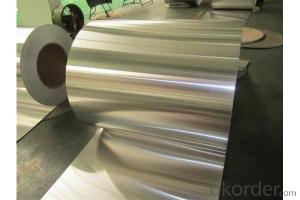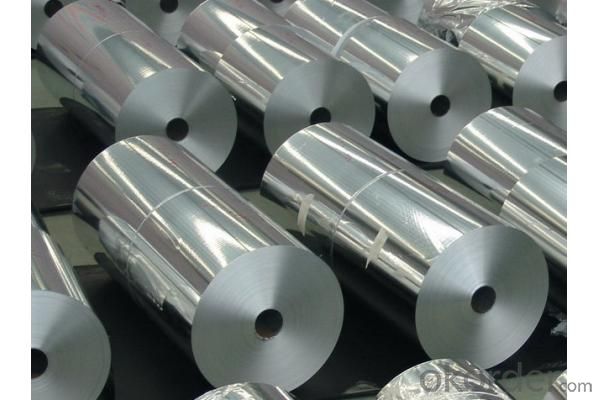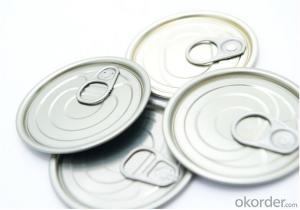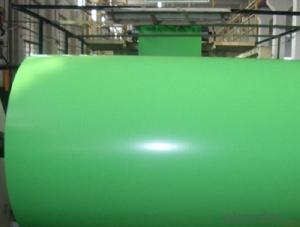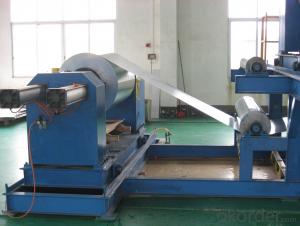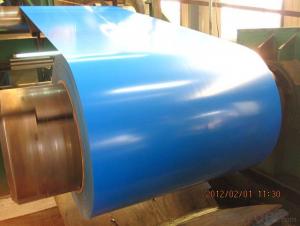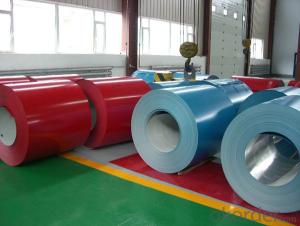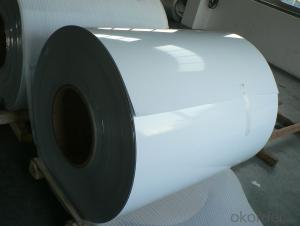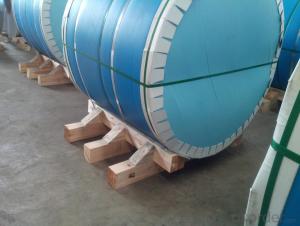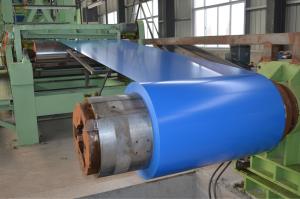Aluminum Roof Coil 5052 Alloy Superior Hardness Heatproof Apparatus Coils
- Loading Port:
- Tianjin
- Payment Terms:
- TT OR LC
- Min Order Qty:
- 100 m.t
- Supply Capability:
- 10000 m.t/month
OKorder Service Pledge
OKorder Financial Service
You Might Also Like
Specification
Specification:
Alloy | Temper |
1050 1060 1070 1100 | H112, H24, O |
2024 LY12 LY11 2A11 2A14 2017 2A17 | H112, T4, T351, T6 |
3A21 3003 3103 3004 3005 3105 | H112, H24, O |
5052 5754 5005 5083 5086 | H32, H112, H111, H24, O |
6063 6061 | H112, T6, T651, T5, T4,O |
Specification | 1.Thickness: 0.2-60mm 2.Width: 500-2000mm 3.Length:According to requirement 4.Temper: Various status Coils can be produced as your request. |
Application | Mainly used in construction, decoration, packaging, printing, covers material, signs,billboards, building exterior decoration, bus body, high-rise buildings and factories wall decoration |
Alloy Series | Typical Alloy |
1000 Series | 1050 1060 1070 1100 |
2000 Series | 2024(2A12), LY12, LY11, 2A11, 2A14(LD10), 2017, 2A17 |
3000 Series | 3A21, 3003, 3103, 3004, 3005, 3105 |
4000 Series | 4A03, 4A11, 4A13, 4A17, 4004, 4032, 4043, 4043A, 4047, 4047A |
5000 Series | 5052, 5083, 5754, 5005, 5086,5182 |
6000 Series | 6063, 6061, 6060, 6351, 6070, 6181, 6082, 6A02 |
7000 Series | 7075, 7A04, 7A09, 7A52, 7A05 |
Chemical Composition:
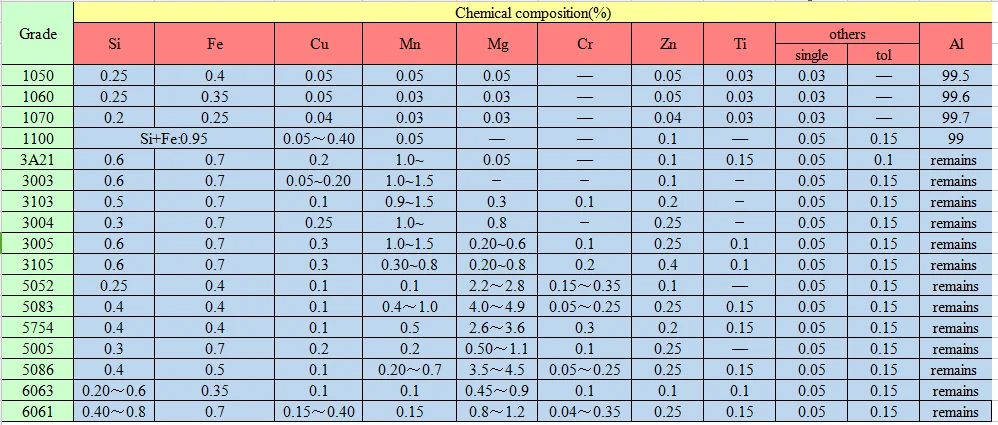
Packaging & Shipping
| Packaging Detail |
Coil is placed to the iron or wooden pallet ,rapped by water-proof kraft paper perfectly , then strong fixed by GI iron narrow belt .( About 2.5 ton / pallet ) |
| Dimension | 20 CM x 1220MM X 2440MM |
| Container | 20FT Container can load 25 tons max ; 40FT Container can load 27 tons max ; |
| Shipping | By Sea 20ft/40ft Container |
Our services
Main Services:
> Precision aluminum plate
> Casting products
> Forging products
Special Services:
> Alloy selection
> Aluminum machining techniques
> Hot working
> Surface treatment
Our Promise
---High quality stainless steel with reasonable price.
---Wide excellent experiences with after-sale service.
---Every process will be checked by responsible QC.
---Professional packing teams which keep every packing safely.
---Trial order can be done in one week.
---Samples can be provided as your requirements.
FAQ
Q: Do you have the CE, TUV, UL Certification?
A: We’ve already passed all the tests, and any certificate is available.
Q: Have you ever sold your products to companies in my country?
A: Of course, we have customers in all general PV markets, but I think we should expand our market share along with the market growth.
Q: How do you pack your products?
A: We have rich experience on how to pack to make sure the safety on shipment when it arrives at the destination.
Q: Can you do OEM for us?
A: Yes, we can.
Q: Can we visit your factory?
A: Surely, I will arrange the trip basing on your business schedule.
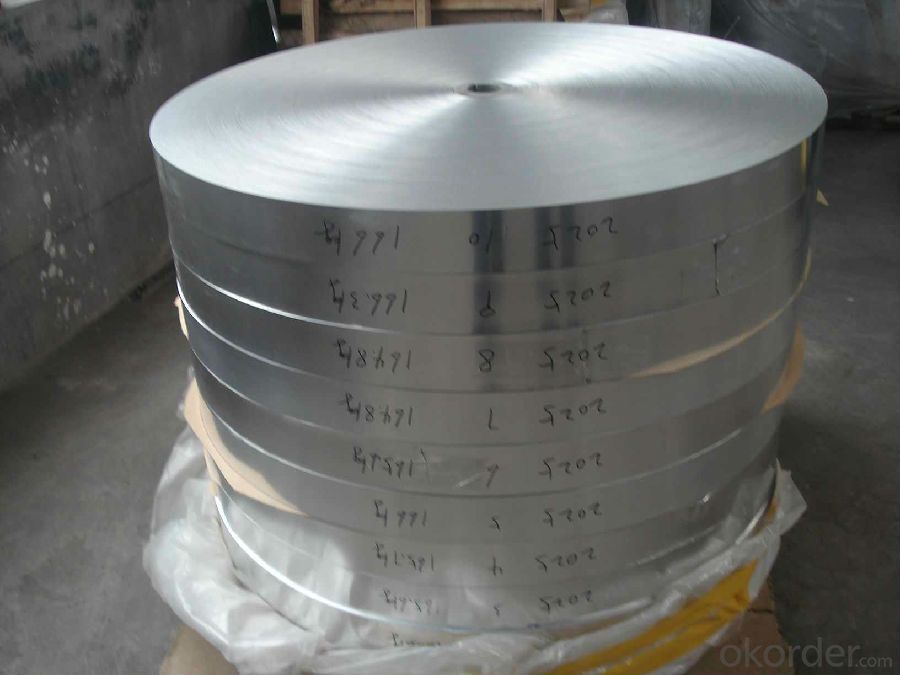
- Q: Are aluminum coils affected by magnetic fields?
- Aluminum coils may be influenced by magnetic fields to some degree. Unlike magnetic materials, aluminum lacks inherent magnetic properties. However, when confronted with powerful magnetic fields, aluminum can develop an induced magnetic field through electromagnetic induction. Consequently, this can lead to a minor attraction or repulsion between the aluminum coil and the magnetic field. Nevertheless, this effect is generally weaker in comparison to materials possessing magnetic properties like iron or steel. It should be noted that the extent of interaction between aluminum coils and magnetic fields relies on various factors including the magnetic field's strength and proximity, the coil's shape and size, and the specific composition of the aluminum alloy utilized in the coil.
- Q: This question asks for a comparison of the benefits and drawbacks of utilizing spring steel wire coils.
- <p>Spring steel wire coils offer several advantages such as high strength and durability, making them ideal for applications requiring resilience and resistance to deformation. They are also known for their excellent elasticity, which allows for consistent performance in dynamic applications. Additionally, spring steel wire coils can be easily formed into various shapes, providing versatility in design and functionality. However, they also have disadvantages, including potential for corrosion if not properly treated, and they can be more expensive than other types of wire due to the material's properties. Furthermore, spring steel wire coils may require specialized tools and equipment for handling and installation, adding to the cost and complexity of their use.</p>
- Q: Can aluminum coils be used in the production of heat exchangers?
- Yes, aluminum coils can be used in the production of heat exchangers. Aluminum is a commonly used material in heat exchangers due to its excellent thermal conductivity, lightweight nature, and corrosion resistance. The use of aluminum coils allows for efficient heat transfer and helps in optimizing the overall performance of the heat exchanger.
- Q: What are the advantages of using aluminum coils in various industries?
- There are several advantages of using aluminum coils in various industries. Firstly, aluminum is a lightweight material, which makes it easier to handle and transport. This is particularly beneficial in industries such as aerospace and automotive, where reducing weight is crucial for improving fuel efficiency and overall performance. Secondly, aluminum has excellent corrosion resistance properties. It forms a natural oxide layer that protects it from rust and other forms of corrosion, making it durable and long-lasting. This makes aluminum coils suitable for applications in industries such as construction, marine, and HVAC, where exposure to moisture and harsh environments is common. Additionally, aluminum has high thermal conductivity, which means it can efficiently transfer heat. This makes it ideal for use in heat exchangers, refrigeration systems, and other applications where effective heat dissipation is required. Moreover, aluminum is a highly recyclable material, and the recycling process requires significantly less energy compared to the production of primary aluminum. Using aluminum coils in industries promotes sustainability and reduces environmental impact, making it an attractive choice for companies aiming to adopt eco-friendly practices. Furthermore, aluminum coils can be easily formed and shaped into various sizes and dimensions, allowing for flexible design options and customization. This versatility makes it suitable for a wide range of applications in industries such as packaging, electrical, and telecommunications. Lastly, aluminum coils offer cost advantages in terms of initial investment and maintenance. Although the upfront cost may be higher than other materials, the long-term benefits of durability, low maintenance requirements, and energy efficiency make it a cost-effective choice. In conclusion, the advantages of using aluminum coils in various industries include its lightweight nature, corrosion resistance, high thermal conductivity, recyclability, versatility, and cost-effectiveness. These qualities make aluminum coils a preferred material for many industrial applications, contributing to improved performance, durability, and sustainability.
- Q: What are the various applications and purposes for which aluminum coils are utilized?
- <p>Aluminum coils have a wide range of applications due to their lightweight, corrosion resistance, and malleability. They are commonly used in construction for roofing and siding, in the automotive industry for car parts and body panels, in the packaging industry for cans and foils, and in electrical applications for wiring and transformers. Aluminum coils are also used in the manufacturing of heat exchangers, cooking utensils, and various consumer products. Their versatility makes them an essential material in many industries.</p>
- Q: i have some questions about aluminum can recycling??:how much can you get from doing that??where can i take them in indianapolis, in???and what else could i recycle??its good for the earth and i need some money!! :) :D thanks!!! :)
- They are worth about $0.01 per can. You can take them to any scrap metal yard.
- Q: Can aluminum coils be used for magnetic purposes?
- Aluminum coils, unfortunately, cannot serve magnetic purposes. Being a non-magnetic material, aluminum lacks any magnetic properties. To harness the magnetic potential of coils, one must resort to materials like iron or steel, which possess magnetic properties. These materials are capable of generating and conducting magnetic fields, unlike aluminum.
- Q: How are aluminum coils used in heat exchangers?
- Aluminum coils are widely used in heat exchangers due to their excellent thermal conductivity and corrosion resistance. They are typically used as the main component in the evaporator and condenser sections of the heat exchanger. The coils facilitate the transfer of heat between two fluids, allowing for efficient cooling or heating processes. The design of the coils, along with their large surface area, helps to maximize heat transfer and enhance the overall performance of the heat exchanger.
- Q: What are some common defects in aluminum coils?
- Some common defects in aluminum coils include: 1. Surface defects: These can include scratches, pits, dents, or waviness on the surface of the coil. These defects can occur during the manufacturing process or due to mishandling during transportation or storage. 2. Edge defects: These can include burrs or uneven edges on the coil. They can be caused by improper slitting or cutting processes. 3. Coating defects: If the aluminum coil is coated with a protective or decorative coating, defects such as peeling, cracking, or uneven coating thickness can occur. This can be caused by improper application or curing of the coating. 4. Corrosion: Aluminum is generally known for its corrosion resistance, but it can still be prone to corrosion in certain environments. Corrosion can manifest as pitting, staining, or white powdery deposits on the surface of the coil. 5. Alloy defects: In some cases, the aluminum alloy used in the coil can have defects such as inclusions, impurities, or improper alloy composition. These defects can affect the mechanical properties and overall performance of the coil. 6. Coil shape defects: Aluminum coils should have a uniform and consistent shape, but defects such as coil set (where the coil retains a curvature after unwinding) or camber (where the coil has a slight curvature across its width) can occur. These defects can be caused by improper tension or cooling during the manufacturing process. 7. Weld defects: If the aluminum coil is made by welding together multiple sheets or strips of aluminum, defects in the welds can occur. These can include incomplete welds, cracks, or porosity. These defects can weaken the coil and affect its structural integrity.
- Q: I have completely disassembled my aluminum bass boat and it is being sandblasted.I am restoring the boat and will be giving it a new paint job.What do you recommend in the way of primer,paint or anything else I need to know.I just don,t want to mess it up by using the wrong thing.Best answer gets a fishing trip in the same boat we are talking about. If you can make it here I will put you on some fish.Catfish,bream,crappie,bass or even saltwater fish.
- Whatever okorder
Send your message to us
Aluminum Roof Coil 5052 Alloy Superior Hardness Heatproof Apparatus Coils
- Loading Port:
- Tianjin
- Payment Terms:
- TT OR LC
- Min Order Qty:
- 100 m.t
- Supply Capability:
- 10000 m.t/month
OKorder Service Pledge
OKorder Financial Service
Similar products
Hot products
Hot Searches
Related keywords
